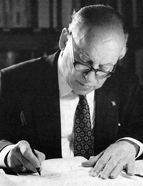

It was with this mental training and solid academic preparation that, upon being admitted to the Faculdade de Letras [School of Arts and Humanities]in 1960, he was entrusted with teaching several subjects for six years. However, his absorbing work as a teacher did not prevent him from publishing books, more than 400 articles and hundreds of entries, notably in the Grande Enciclopédia Portuguesa e Brasileira, Verbo; Enciclopédia Luso-Brasileira de Cultura and Dicionário de História de Portugal, dir. Joel Serrão, from giving lectures - in which he revealed his talent as a brilliant speaker - to organising or participating in various scientific meetings in Portugal and abroad. Meanwhile, he was also working to apply for a position as associate professor in October 1962, writing his dissertation Portugueses no Estudo de Salamanca (Portuguese Students at the University of Salamanca), following on from the works mentioned above. The first volume covered the period from 1250 to 1550. It was an inventory of Portuguese masters and scholastic who attended the University of Salamanca in the Middle Ages and the Renaissance and the influence that the doctrines taught there had on Portuguese culture. An unforeseen incident altered the project: the academic crisis that erupted due to the official ban on Student Day. For defending hundreds of students who had gathered on the University grounds to celebrate it on 7 April 1962, against whom the Minister of Education had ordered the deployment of a large police contingent - which he considered disproportionate and damaging to the University’s prestige - he accepted Lindley Cintra’s invitation to try to calm things down. For several hours, they contained the explosive atmosphere, “susceptible to a physical confrontation with serious consequences” (Meio século... p. 17). Marcelo Caetano was then rector of the University. Following this stance, in open defiance of the dictatorial regime in power, the competition was cancelled by ministerial decision and only after three years was the vacancy reopened, finally granting him the title of professor. However, the next and natural step in his teaching career, which was to become a full professor, for which he applied in 1967, was denied him as retaliation for the position he had taken in the events of 1962. Without ever neglecting teaching and research, he embarked on writing Itinerários de El-Rei D. Sebastião (1569-1572), completed with a second volume covering the years 1573-1578, which were published by the Portuguese Academy of History in 1987. He was interested in the subject because it provided a geo-historical perspective, particularly in the fields of regional history, anthroponymy and toponymy. Along the same lines are the Itinerários de El-Rei D. João II (1481-1495), published by the same institution in 1993.
This work is financed by national funds through FCT - Foundation for Science and Technology, I.P, in the scope of the projects UIDB/04311/2020 and UIDP/04311/2020.
